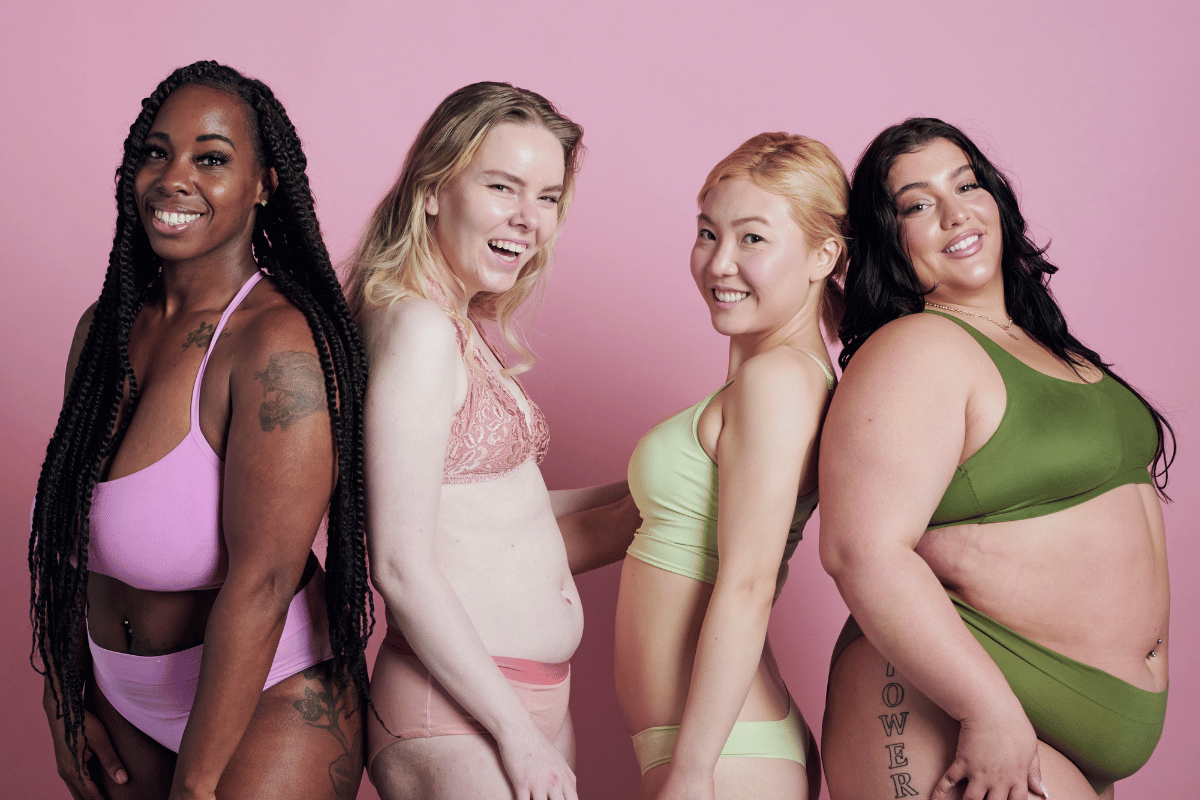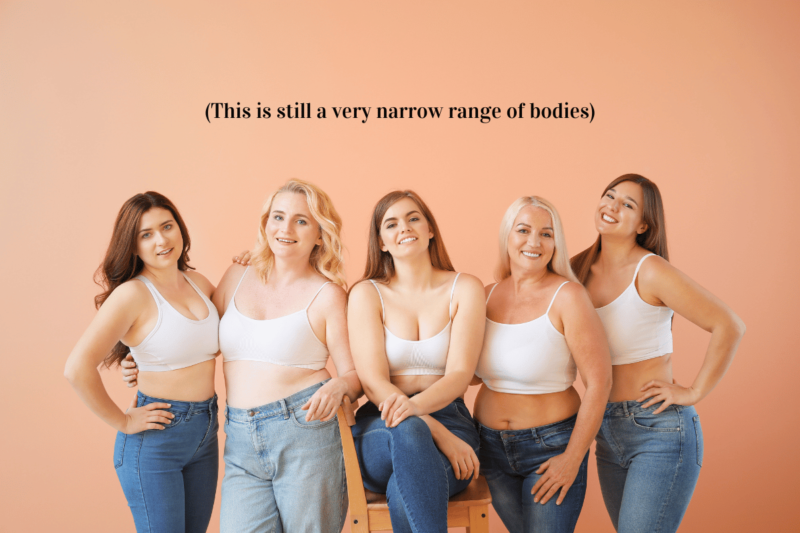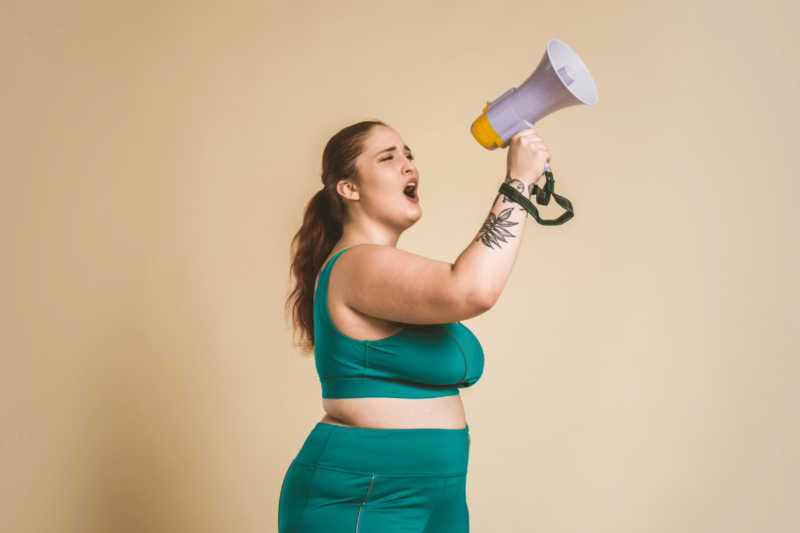
I’m so over body positivity. It’s been completely co-opted by social media influencers in average-size bodies, companies who often give lip-service to the term as they try to sell you something — and by the weight loss industry.
This co-opting has diluted the body positivity message, even turning it into toxic positivity (“If you don’t love your body all the time, you’re doing something wrong!”) in some instances.
While “body positivity” remains a buzzy catchphrase, the origins of the body positive movement run much deeper than its current commercialized manifestations.

What body positivity was intended to be
Body positivity has its roots in late 1960s social justice movements created by and for people in marginalized bodies — particularly fat, Black, queer, and disabled bodies — to talk about the oppression they experience in society and fight back against discrimination in the workplace, doctor’s offices and other public settings.
Flash forward to 2012, and influencer culture begins to take hold of the idea of body positivity. The first wave was plus-size influencers using #BodyPositive and #BoPo on social media, then came thinner influencers who tended to focus on loving themselves despite cellulite and other body “imperfections,” followed by corporations that wanted to capitalize on the trend.
The original body positive movement was about stopping appearance-based oppression, but the more modern manifestation is about expanding what’s viewed as beautiful. Not the same thing.
The idea of body positivity in its various forms gained traction as more people rejected society’s beauty and body standards and stopped trying to shrink their bodies. This has led to a few interesting outcomes.
One is that body positivity has been adopted — or co-opted — by the weight loss industry as part of its adaptation to the growing anti-diet movement. Another is that the movement’s messages have become lost.

Dilution and toxic positivity
One problem with today’s “watered down” version of body positivity is that it’s become synonymous with body love, sometimes even in a “toxic positivity” way — as if something’s wrong with you if you don’t love your body.
But you don’t have to love everything about the way your body looks to be able to care for it
The current state of body positivity has lead many people to reject the term in favor of body neutrality, body respect, body acceptance — and, increasingly, body liberation.
Body acceptance and body neutrality suggests a middle ground between body loathing and body love. It’s about simply allowing your body to exist without investing time and energy into loving or hating it. The reality is that body image can change from day to day, so it can feel very freeing to let go of the expectation that we have to always have to strive for love and positivity.
“Wait,” you may be thinking, “don’t you have to love your body to peacefully live in your body? To have a full, rich and meaningful life?” No, I don’t think so. That’s why some of the interviews that actor Emma Thompson did when promoting her 2022 film “Good Luck to You, Leo Grande” really resonated. In one interview in particular, I appreciated what she said this about her “bravery” in doing nude scenes:
“It requires bravery because I live with a body I don’t like. And I don’t know any woman who lives with a body that she likes. And so my question I think for everybody these days is: why are we wasting our time, our passion, our energy and our money on hating ourselves and not enjoying the vehicles that we have to live in?”

The science behind body positivity
It’s worth noting that body positivity — or positive body image, really — as it is defined by researchers is different than how it’s come to be viewed or defined in popular culture.
In the research, positive body image has two main components:
- One is body acceptance — accepting one’s body as it is, including its functionality and appearance — which includes caring for and respecting the body.
- The other is body image flexibility, which refers the ability to openly experience thoughts and feelings about the body — even negative ones — without acting on them or trying to change their body in order to stop those thoughts and feelings.
Body acceptance is not the same thing as body satisfaction, and in fact someone can accept their body at the same time they are not satisfied with it. Research suggests that, among women, body appreciation increases with age even when body satisfaction does not.
A 2019 study of 344 college students found that students who appreciated their bodies were more likely to engage in preventive health behaviors — such as eating a healthy diet and engaging in physical activity — but those who were only satisfied with their bodies were not. Previous research found that college students who score high for body appreciation are less likely to diet or use weight loss pills, supplements or shakes.

Why body liberation?
Body liberation is freedom from other people’s expectations about your body (“other people” could be specific people, or society at large). It leaves room for you to love your body, but doesn’t require it. It rejects the idea of beauty standards — including “ideal” body sizes — serving as social currency.
Body liberation includes liberation from body standards as well as body autonomy — something that has particular relevance in the current political climate, where body autonomy is being stripped away.
Body liberation is both…
- An internal process of cultivating positive body image (in the research-defined sense), and
- A pushback against attitudes, institutions and systems that say there’s a narrow range of “right” ways to have a body.
Really, it’s very similar to the intentions of the original body positivity movement. Body liberation is something you can seek for yourself and for other people. Because we are all worthy of it.
One question I get a lot is, “How do I stop caring about what other people think about my body/my size/my recent weight gain?”
Body liberation isn’t necessarily about not caring what people might think about your body or what you choose to do with your body, per se, it’s about living your best life even when, yeah, you do kind of care what people think. It’s knowing that your experience and your choices are more important than others’ opinions — in part because their opinions may very well may be informed by their own baggage about their own bodies.
To get a bit cheeky, opinions are like a**holes—every one has one. And…other people’s opinions are none of your business.
Body liberation is REAL
One of the beautiful things about body liberation is that it allows you to feel your feelings about the BS that society heaps on us. It doesn’t require that you feel body love and happiness.
That’s important, because we can’t feel only “positive feelings.” We are meant to experience the full range of emotions and learn how to sit with the uncomfortable ones, or how to cope with them in helpful ways.
Related Posts + Recommended Reading
- Post: Beyond body positivity: respect, acceptance, liberation
- Post: What is embodiment? The power of body stories
- Book: “More Than A Body: Your Body is an Instrument, Not an Ornament” by Lindsay and Lexie Kite
- Book: “The Body is Not An Apology: The Power of Radical Self-Love” By Sonya Renee Taylor
- Book: “Positive Body Image Workbook: A Clinical and Self-Improvement Guide” by Nichole Wood-Barcalow, Tracy Tylka and Casey Judge (this book is research-based and really in depth, covering embodiment, body appreciation, self-care, intuitive eating, social comparison, and body talk)
This post contains Amazon Affiliate links. As an Amazon Associate I earn from qualifying purchases.
 Print This Post
Print This Post






